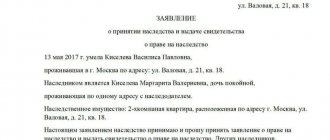If a spouse dies, then his husband or wife can take advantage of the property rights that are prescribed by law. They are considered the closest relatives, which gives them the opportunity to inherit certain material objects in the form of an apartment, dacha, car, garage and other things. The question of what rights a spouse has when inheriting in 2022 most often arises when, in addition to the wife or husband, other claimants to the inheritance also claim their rights.
It is advisable to consider the problem of marital rights in inheritance in two aspects. It all depends on the circumstances under which the property previously came into the possession of the deceased. For example, it could have been purchased before the wedding or after it.
Inheritance, joint property
Property assets acquired by spouses during marriage, in accordance with current Russian legislation, are considered common.
According to the law, the common property of a husband and wife includes the following items:
- real estate/movable property purchased during official family residence (apartment, own house, vehicles, household equipment, furniture items, other items supported by an agreement);
- financial resources (scholarships, salaries, pensions, cash benefits, business profits);
- investments (bank deposits, securities, shares, shares in capital).
Both spouses have equal rights to the listed material assets. Each person legally owns 50% of the jointly acquired property.
But in addition to common property values, the law also provides for personal property (property purchased before the official marriage, inherited or gifted, received even during marriage). Such material assets belong to a specific owner and are not subject to division.
Shares of children and wife according to law
When distributing the shares of the wife and children, some nuances may arise. In accordance with the law, if a husband and wife had common property, then his wife receives her 50% of it, and the remaining 50% is divided in equal shares among all first-priority heirs, which also includes the spouse.
The man's inheritance is divided in the same way if the property was purchased during marriage (car, apartment, shares, etc.).
For example, after marriage, an apartment was purchased and registered as the property of the husband. The marriage produced two children together. After the death of a man, his wife receives 50% of the apartment as her property, as her property acquired during marriage.
The remaining 50% of the apartment is divided into 3 parts - the inherited share of the wife and two children. That is, children receive 1/6 of the apartment ownership, and the spouse - 2/3.
Dear readers! To solve your problem right now, get a free consultation
— contact the on-duty lawyer in the online chat on the right or call:
+7
— Moscow and region.
+7
— St. Petersburg and region.
8
- Other regions of the Russian Federation
You will not need to waste your time and nerves
- an experienced lawyer will take care of solving all your problems!
Inheritance
After the death (death) of the husband, the wife has full right to her own share of the common property, that is, 50%. The other half, which belongs to the spouse, is inherited.
Example:
- A married couple living in an official union bought an apartment. Accordingly, after the death of her husband, the wife legally claims half of the living space, since it was acquired in a legal marriage and is common real estate. The second half of the living space is inherited, that is, divided equally between the wife, children, and parents.
It is important to understand! Half of the apartment and personal material assets (even if they were shared with the spouse) belong by law to the wife and are not subject to inheritance.
Example:
- The husband and wife lived in a private house, which the wife inherited from her deceased parents. After the death of her husband, the children from his first marriage decided to declare their right to inherit part of this living space, mistakenly considering the house to be the common property of the spouses. In this particular situation, the property is not subject to inheritance, since their father, by law, was not its owner, even on a common basis with his wife.
It is important to note! The personal property of the deceased husband is divided among all relatives (wife, children, parents) in equal parts. Moreover, without prior allocation of 50% of this property to the spouse.
Example:
- Even before the marriage, the man privatized the apartment in which the couple subsequently lived. After his death, his wife wished to receive 50% of the property on the basis of co-ownership. But the law determined in this situation her right of inheritance on a common basis with all other relatives of her husband.
It is important to understand! Of the common property values of the spouses, after the death of the husband, relatives have the right to inherit only 50% of such property in equal parts, the husband’s personal belongings are inherited in full on a general basis, the wife’s personal belongings are not subject to inheritance.
State duty
In this case, the heir, no matter by law or by will, is obliged to pay a state fee for issuing a certificate of inheritance in the amount calculated from the value of the transferred property (clause 22 of Article 333.24 of the Tax Code of the Russian Federation), namely:
- 0.3% - children, spouses, parents, siblings, but not more than 100 thousand rubles;
- 0.6% for the rest, but not more than 1 million rubles.
The final document confirming entry into the inheritance is a certificate issued by a notary after 6 months have passed from the date of death of the testator. If all the heirs showed up before the specified deadline and provided comprehensive documents, then the certificate may be issued earlier.
Often, the division of inheritance between relatives causes a lot of disputes, even between such close ones as a wife and children. Such difficult relationships can be resolved in court.
Legal division of property after the death of a husband
Since today in the Russian state the practice of drawing up a will is not quite common, and after the death (death) of a spouse there is no document of a similar form, property division is carried out in the order of priority established by current Russian legislation.
Regardless of what kind of relationship the relatives had with the deceased, the law specifically defines the order of inheritance rights to the property values of the deceased. The order of inheritance is determined by the Civil Code of the Russian Federation and is divided into the following categories:
- First stage - children, husband/wife, parents;
- Stage II - brothers/sisters, grandchildren, grandparents;
- III stage - uncles/aunts;
- IV stage - great-grandchildren, great-grandfathers/great-grandmothers;
- V turn - cousins, grandparents;
- VI line - cousins/aunts, nephews, great-grandchildren;
- VII turn - stepdaughters, stepfathers/stepmothers.
In addition, persons who have been fully supported by the testator for at least a year, but if they are not his blood relative, have the right to claim part of the property values of the deceased. In court, this fact requires mandatory confirmation.
It is important to understand! The category of citizens of the second priority can apply for participation in the division of inherited property values only in the absence of citizens of the first priority. This rule applies accordingly to subsequent categories of heirs.
Inheritance according to law
Inheritance legal relations, which develop on the basis of legislation, involve the division of the property of the deceased between persons who have family or marital ties with him. According to legislative norms, the estate is distributed when a will was not drawn up, or after the death of the testator the document was canceled. The successors who are included in the first place include:
- children;
- wife;
- parents;
- husband
If there are no successors of the first stage, then the property of the deceased is distributed among the second stage, which includes: grandparents, brothers, sisters. Further distribution is made according to the specified principle. Indications of cohabitants, mistresses, etc. is not in the list of relatives who have rights to the inheritance mass.
Expert commentary
Potapova Svetlana
Lawyer
The only chance a common-law wife has to receive part of the inheritance is to prove that she is dependent on the deceased. In this case, the woman becomes the legal successor belonging to the last line.
Confirmation of the fact of dependency requires a woman to:
- Prove that the deceased was in charge of its maintenance. It is worth noting that the fact of dependence must be proven for the last 12 months that preceded the death of the man. If material assistance was provided several times, this fact is not considered dependent.
- Provide documentary evidence that over the last year she lived in the same living space as the deceased.
- A woman must have an official status, according to which she is deprived of working capacity or legal capacity.
The legislation does not indicate how such status should be obtained. There are two options: due to health status or age. A woman must be recognized as disabled, and the group will be 1 or 2. She can also receive pension benefits upon reaching the age of 55.
The fact that the woman received a pension or benefits is not taken into account. However, such income must be less than the assistance provided by the cohabitant. The above conditions must be met in their entirety.
In a situation where a woman was able to prove the fact of being a dependent, two options are provided for the development of events:
- the cohabitant acts as legal successors, the order of which is established by law (she will receive the right to an equal share of the property as the other heirs of this order);
- if there are no other claimants to the property who come in last, then the woman becomes the sole owner of the share.
Inheritance procedure
After the death of her husband, after a certain period, the wife begins to wonder how the common property is divided after the death of her husband, his personal material assets, the property he inherited, etc.
This process is organized and carried out in accordance with the procedure established by law. The wife, who is included in the list of heirs, must first write a corresponding statement to the notary.
This document must reflect the following information:
- date of death of husband;
- the cause of his death;
- the spouse’s decision to accept the inheritance left by the spouse;
- readiness for the process of property division if necessary (if the husband indicated other relatives in the will or such a document is missing).
Simultaneously with the application for inheritance of property values passing from the late husband, it is necessary to prepare the following package of documents:
- original death certificate of the husband;
- a certificate of the deceased’s last place of residence with a list of persons who are registered with him in this living space;
- original and copy of the applicant’s passport;
- original and copy of marriage registration certificate;
- documents for acquired movable/immovable property during the period of official family residence.
Important! When submitting an application with the listed documents, it is important to comply with the deadlines established by law - 6 months (it is after this period that the persons who are entitled to part of the property of the deceased officially take ownership rights).
If the period established by law for processing documents is violated, it will be quite difficult to enter into inheritance rights for further disposal of property values, especially if third parties apply for the right of inheritance.
After receiving the application with the attached package of documentation, the notary makes a separation of the legal half of the spouse from the common property. Issues the appropriate certificate of ownership.
Next, the remaining half of the couple’s property (real estate, cars, household equipment, etc.) will be divided among all relatives. Important! If various controversial issues arise among the legal heirs, they are resolved in accordance with the current legislation in court.
Husband's right to inheritance
Inheritance is the transfer of ownership from a deceased person to other persons. A person, both an elderly person and a minor child, has the right to inherit property.
There are two types of inheritance :
- by will;
- in law.
For your information
Inheritance under a will is formalized by the testator before his death. The initiator is a legally capable person who has reached the age of eighteen. The composition and content must be kept secret (Article 1123 of the Civil Code).
This document must be in writing, drawn up in two copies and executed in the presence of a notary. In it, the testator describes the property that he has, as well as the persons who will receive it in the event of his death.
This will is kept by the deceased, as well as in the notary’s office, where this document was executed. To find out whether there is a will, you should examine the personal belongings of the deceased. After this, within six months you should contact the notary who certified the document.
As for inheritance by law, it is valid in the event that there is no will. The law establishes certain lines of relatives who have the right to inherited property.
The wife is the person who is directly in the first line of heirs along with the children and parents of the deceased husband. If the testator does not have children or parents, all property will go to his wife (Article 1142 of the Civil Code of the Russian Federation).
Example
The testator has relatives, namely: his wife, daughter, and parents. There is also real estate: an apartment, a summer cottage and a car. In accordance with Art. 1142 of the Civil Code of the Russian Federation, they all have the right to claim this property in equal shares.
All of the above relatives who express a desire to inherit the property of the deceased submit an application and the necessary documents for acceptance of the inheritance to the notary's office. The application must be submitted within six months from the date of opening of the inheritance. The day of death of the testator is the day of opening of the inheritance.
Everyone has the right to refuse to accept an inheritance (Article 1157 of the Civil Code of the Russian Federation), for this it is necessary to submit a refusal in writing. If the heir does not submit any documents, refusals or statements within six months after the death of the testator, these inactions are regarded as a refusal of the inherited property.
Usually the testator's property is divided equally, but there are cases when the shares are not always equal .
Example
Ivanova, who survived her husband, has the right to 1/2 share in jointly acquired property, as well as a share of inheritance in the second half on an equal basis with other relatives. Consequently, the spouse's share increases.
After six months after death, the notary issues certificates of inheritance to relatives. If real estate is inherited, the transfer of ownership must be registered with the relevant government bodies (territorial division of Rosreestr).
The nuances of dividing parents' property between children
The process of inheritance by children, especially when they are from different marriages, of the property values of their parents is accompanied by some nuances.
It is important to understand the main point! The children of the heir, no matter from what marriage they were born, have equal rights to inheritance. Even children who are still in the womb have rights to inheritance (immediately after birth they are considered full heirs).
It is also worth considering the fact that adopted children, when dividing the inheritance, are equated to the first-priority category of heirs—bloods. At the same time, they no longer have the right to claim the property of their own biological parents. But there are still exceptions.
Example:
- If an officially adopted child maintains a relationship with his biological parent, then, according to a court decision, he has the right to count on a share of the property after the death of his own adoptive parents and biological relative.
For legitimate children, it does not matter whether they were born in a civil, legal marriage or even outside of a marital union - one rule applies to everyone. That is, even an illegitimate child, when establishing the fact of paternity, participates in the division of the property of the deceased biological father on equal rights with legitimate children.
If the husband dies, who are the first priority heirs?
During marriage, a family acquires a fairly large amount of common property. This includes not only property registered in joint ownership of spouses and children, but also property purchased during marriage by each family member. The inheritance mass may include not only property, but also life insurance, shares, deposits, etc.
In this case, the heirs of the first stage receive the right to their part of the inheritance:
- sons and daughters of the deceased from all marriages;
- his wife - subject to state registration of marriage;
- his parents, if they are still alive.
And only if the heirs of the first stage refuse the inheritance, it passes to the heirs of the second stage and further. There are 7 inheritance queues in total.
Undeniable share of inheritance
As a rule, inherited property, in accordance with current legislation, is divided between the participants of the will in appropriate shares, without a gift, in the established order between categories of relatives.
But there is also a category of persons who have inheritance rights to part of the inherited property in any situation, even regardless of the wishes of the testator. These include:
- children (it doesn’t matter whether they are natural or adopted) of the deceased, who have not reached the age of majority, and who are unemployed;
- spouse, parents, adoptive parents who do not work and do not receive pension benefits;
- persons who have been fully supported by the testator for at least one year do not have a job.
It is important to understand! Property can be disposed of in the event of death only by performing certain legal actions. Obtaining the right to inheritance is a difficult procedure that requires certain legal knowledge of the provisions of the current legislation. Therefore, it is better to rely on a professional in this matter, that is, a notary who knows how to solve it legally.
Under contract
Property legal relations between spouses can be completely different in the presence of a marriage contract. This document comes into force from the moment it is signed and certified by a notary or from the date of state registration of the marriage, if the agreement was concluded earlier.
The subject of a marriage contract is usually a change in the legal regime of joint property of the spouses. By mutual agreement, the following may be established for property acquired during marriage:
- Separate property. All material benefits received by the spouses during the validity of the contract become the personal property of each of them, regardless of the investment and the basis for receipt. In this case, division is not carried out, since all property belongs only to the one who registered it in his own name.
- Share. The agreement specifies the percentage or share of the material assets assigned to each of the spouses after the termination of the marriage. It may also provide additional guidance regarding the inclusion of inherited property as part of the marital property.
- Joint. This regime is very similar to that established by law, with the exception of the ability of the spouses to regulate its individual provisions themselves, for example, to divide the inheritance in the event of a divorce or, conversely, to exclude it from the joint assets under any circumstances, even with a significant improvement in the property.
It is important to remember that a marriage contract acquires legal force only if it is concluded by fully capable and adequate spouses and only after notarization.
What to do with common property?
If the deceased person during his lifetime did not indicate in his will who is entitled to certain shares in the inheritance, then by law, if there are many relatives, the property will pass to several owners.
Thus, it will belong not to one owner, but to several people. After this, the property will be called common. It is mandatory for minors and unborn children to apply for it.
Also of interest may be materials regarding inheritance after divorce:
- When is an inheritance considered joint property?
- Is inheritance divided between spouses during divorce?
- The rights of a wife when inheriting property jointly acquired with her husband and what share can she claim?
Recognition of the right of a spouse during inheritance
Recognition of the rights of a spouse to the property of the deceased spouse does not depend on the opinion of other heirs. The latter has the rights both to allocate his share and to a share in the opened inheritance.
This right can be limited only if there was a written expressed will of the deceased regarding his property, when the deceased excluded the spouse from the list of heirs, and there are no grounds for recognizing the latter as an obligatory heir, or by a court decision the spouse was recognized as an unworthy heir.
But in this case we are talking only about property from which everyone’s marital share has already been allocated and to which the living spouse claims unconditionally by virtue of the law.
State duty and other expenses
The legislation exempts close relatives from paying tax upon entering into inheritance rights. However, state duty cannot be avoided. It consists of the estimated value of the transferred property, and depends on the degree of relationship of the person entering into inheritance rights.
Attention! Receivers who entered into inheritance on the basis of the first two stages are required to pay 0.3 percent of the value of the property to the state.
For other heirs, the payment amount is increased to 0.6 percent.
A widow will be exempt from state duty if she is:
- hero of the Soviet Union and Russia;
- if her husband died in service while performing his duties;
- veterans and participants of the Second World War are also exempt from duty;
- the widow has been declared legally incompetent and is under designated guardianship;
- if there is an order of glory;
- if the testator died as a result of saving other lives and participated in eliminating a man-made accident.
Disabled people of the first and second groups receive a 50 percent discount when paying the fee.
Since the market value is determined in advance before paying the fee, it is necessary to contact an independent expert, whose costs will be additional when registering an inheritance. The notary office sets the price for opening an inheritance case and for individual notarial requests made at the time of entering into an inheritance. In addition to the notary, you need to pay for certain services related to obtaining documents.
A financial contribution will also be required for a copy of the Unified State Register. At the stage of real estate registration, payment for registration actions will be required.
In what cases can they refuse?
The notary can inform the applicant that he should better prepare for visiting the notary's office and collect all the necessary documents. This, of course, will require a lot of time and effort, but there is no other way out. This is one of the common reasons for refusal when trying to enter into an inheritance.
Another important reason is missing the deadline set by the state. In this case, the notary has the right to refuse to accept the documents to the applicant.
When deciding to refuse an applicant, a specialist must draw up a document stating the reason for the refusal.






